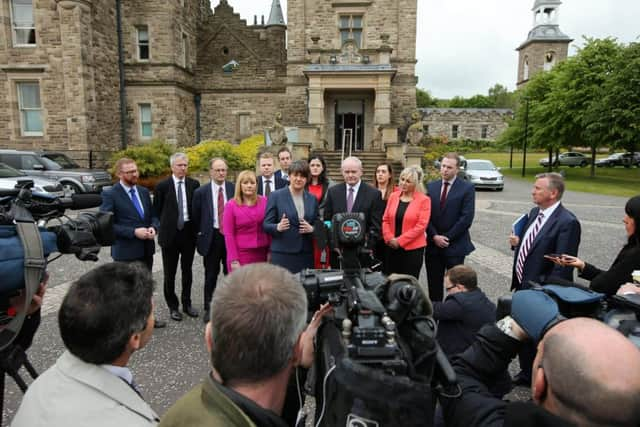Ben Lowry: If ministers have real power, then few 20-somethings are suited to wielding it


In January I wrote about the youthfulness of the government at Stormont.
This week it got younger still. The average age of our 12 ministers is 41.
Advertisement
Hide AdAdvertisement
Hide AdOnly two of the ministers are over the age of 50, Mairtin O Muilleoir (57) and Martin McGuinness (66).
Three ministers are in their 40s (Arlene Foster, 45, Michelle McIlveen, 45, and Peter Weir, 47).
Seven ministers are in their 20s and 30s (Megan Fearon 24, Claire Sugden, 29, Chris Hazzard, 31, Paul Givan, 34, Alastair Ross, 35, Simon Hamilton, 39, Michelle O’Neill, 39).
Stormont has now lost some of its most able and experienced operators (such as Nigel Dodds and Mark Durkan) due to the ban on double jobbing. My view is that a ban was unnecessary and if electors endorse someone as MLA and MP it should be permitted (but with a single salary and single office costs allowance).
Advertisement
Hide AdAdvertisement
Hide AdGiven the exodus to Westminster, it is encouraging that it has been possible to form an Executive team that does have potential.
Age and experience are not the only relevant considerations in a ministerial appointment – clearly a competent 35-year-old politician is preferable to an incompetent 60-year-old one.
But despite all those points, if people are becoming ministers in their 20s it raises serious questions.
The commentary trend in recent days has been to raise an eyebrow at the appointments of Megan Fearon and Claire Sugden but to wish them well and hope that they have good advice and say that they need time to prove themselves. This is a commendably polite response but an inadequate one.
Advertisement
Hide AdAdvertisement
Hide AdMs Fearon, the new junior minister, is a mere 24 years old. If someone is becoming a minister at that age there are only a few possibilities:
Either they are brilliant, and capable of rising to the demands of a key governmental role more than a decade earlier than even their most talented peers.
Or else the position is of little consequence, and experience is not needed, in which case it raises urgent questions as to why the post has been given ministerial status and remuneration.
A further possibility is that the position is indeed important but the youthful incumbent is nowhere near experienced or mature or able enough to hold it, in which case there should be a public outcry.
Advertisement
Hide AdAdvertisement
Hide AdIt is inconceivable for someone to reach the top of professions such as law or medicine at that age. Occasionally, if a surgeon is extremely capable and a post comes up at the right time, they might be elevated to consultant grade by age 35.
In law, on occasion a leading barrister will be made QC in their late 30s, but rarely.
But both examples above will relate to experts who are among the smartest people of their generation, and who have crammed immense levels of effort and time and experience into their decades of study and work.
Claire Sugden is older than Megan Fearon but at 29 she is extraordinarily young for a post as challenging as justice minister.
Advertisement
Hide AdAdvertisement
Hide AdIt is no personal comment on her to be concerned about the ability of any independent politician aged 29 to acquit themselves in that role.
There are major challenges in justice.
It is clear to most of us, for example, that legal aid needed to be reformed but it is also clear that legal aid is at the cornerstone of access to justice. Navigating those two truths would be hard for anyone, let alone someone in their 20s. Even the brightest graduates of the world’s best universities, such as Cambridge or Harvard law post doctorates, would need expert assistance.
Who will Ms Sugden turn to as her Spad?
In the absence of a party machinery, who will help guide her ideological approach? Parties have ideologies and stand for election on the basis of them, as expressed in their manifestos.
There are multiple other issues in justice. A fortnight ago I wrote about alarming bail policy matters.
Advertisement
Hide AdAdvertisement
Hide AdOther issues include the relentless examination of prison conditions (reports into which are seized on by critics who want the authorities to make life easier for dissident terrorists).
In common with other commentators I wish Ms Sugden well but there are grave doubts as to the suitability of the appointment.
• Gender imbalance
Politics here, in Great Britain and in most western countries has long been criticised for not having enough leaders from racial or sexual minorities or who are female.
In the main these criticisms have been appropriate, although when it comes to women insufficient credit is given to the fact that many women willingly either drop out of professional life when they want to start a family, or, perhaps more often, cut their work commitment (ie hours).
Advertisement
Hide AdAdvertisement
Hide AdWe reported in March that more women than men (53% to 47%) have applied for redundancy from the civil service in NI in the current wave. This will reduce the percentage of female civil servants.
That these redundancies are voluntary helps illustrate why it is unfair to blame gender imbalances entirely on factors such as discrimination.
Ben Lowry (@BenLowry2) is News Letter deputy editor